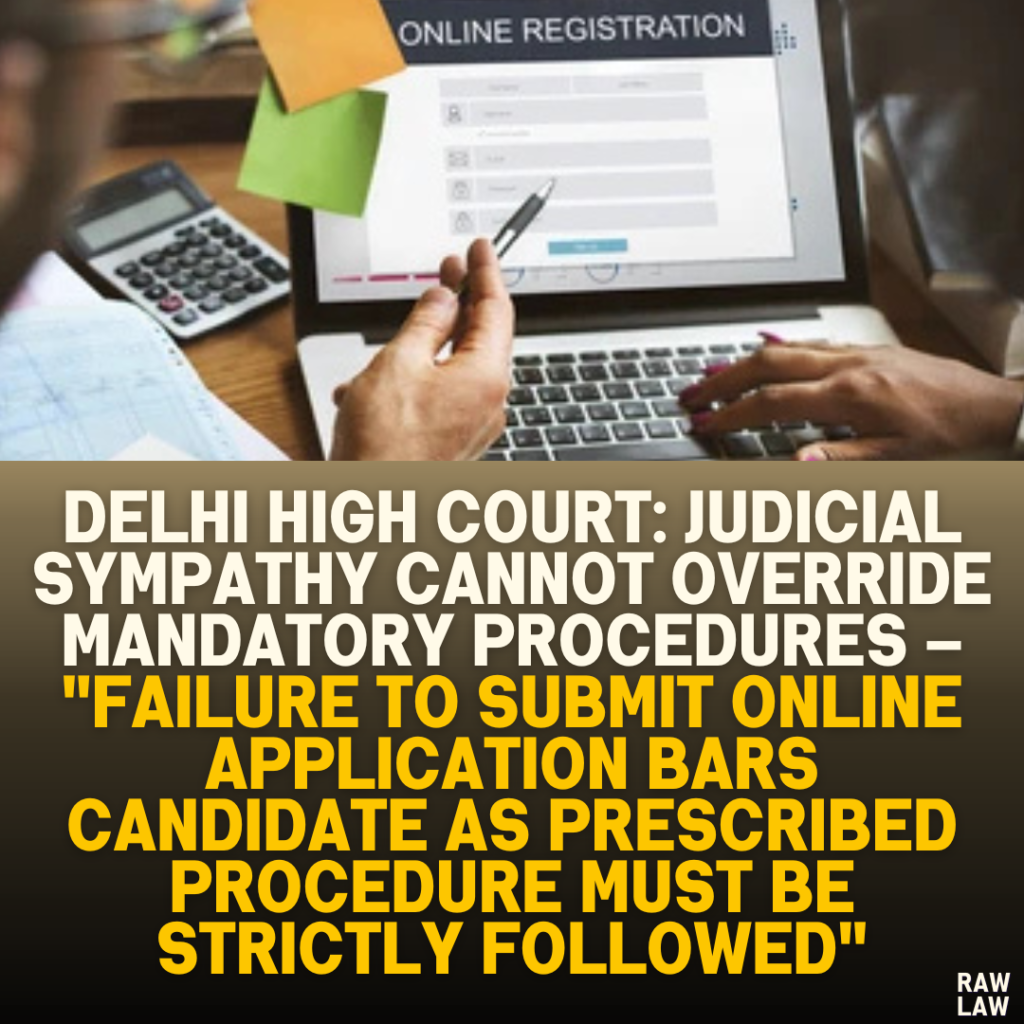Court’s Decision
The Delhi High Court quashed the Central Administrative Tribunal’s (CAT) order, which had directed the Union Public Service Commission (UPSC) to consider the respondent’s offline application for a Limited Departmental Competitive Examination (LDCE). The court held that compliance with the stipulated online application process was mandatory and rejected any deviation, asserting that “if a prescribed procedure requires a thing to be done in a particular way, it must be done that way or not at all.”
Facts
The case revolved around a notification issued by the UPSC for the LDCE for appointment as Section Officers. The notification explicitly required candidates to submit their application forms online, followed by a certified hard copy routed through their department. The respondent admitted that she could not complete the online application process but claimed to have submitted a hard copy to her department, which was subsequently forwarded to the UPSC.
The CAT allowed the respondent to take the examination provisionally and directed UPSC to declare the results based on her performance. This order was challenged by UPSC.
Issues
- Whether the respondent’s failure to submit the online application as required rendered her ineligible to participate in the LDCE.
- Whether the Tribunal could exercise discretion in favor of the respondent, despite her non-compliance with the stipulated procedure.
Petitioner’s Arguments
- The online application submission was a mandatory requirement per the notification and instructions issued by the UPSC.
- The respondent’s inability to submit the application online amounted to non-compliance with essential eligibility criteria.
- Allowing deviation would set a precedent for future cases, undermining the integrity of the selection process.
Respondent’s Arguments
- The failure to submit the online application was due to genuine difficulties and not willful neglect.
- A hard copy of the application was submitted to her department and forwarded to UPSC, demonstrating her intent to comply.
- Denying her candidature would cause undue hardship.
Analysis of the Law
The court emphasized the principle from Nazir Ahmad v. King-Emperor and subsequent judgments that when a procedure is prescribed by law or rules, it must be strictly followed. The mandatory nature of the online submission requirement was reinforced by:
- The clear language in the UPSC notification.
- The Supreme Court’s rulings in Mahendra Singh and Chandra Kishore Jha, holding that prescribed procedures cannot be bypassed under the guise of judicial sympathy.
Precedent Analysis
- Nazir Ahmad v. King-Emperor – Highlighted the necessity of following prescribed procedures strictly.
- Union of India v. Mahendra Singh – Affirmed that deviation from the prescribed procedure undermines the probity of the process.
- Chandra Kishore Jha v. Mahavir Prasad – Stated that statutory requirements must be adhered to in the manner prescribed.
Court’s Reasoning
The High Court reasoned that:
- The respondent admitted her inability to complete the online application, violating the mandatory requirements.
- Permitting exceptions could lead to misuse and weaken procedural discipline.
- While the court empathized with the respondent’s difficulties, it could not grant relief contrary to established principles of law and procedure.
Conclusion
The High Court allowed the UPSC’s writ petition, setting aside the CAT’s order and dismissing the respondent’s original application. The court reiterated that judicial sympathy cannot override mandatory procedural requirements.
Implications
This judgment reinforces the strict adherence to procedural requirements in competitive examinations. It sends a clear message that non-compliance, even if unintentional, cannot be condoned to ensure fairness and consistency in public recruitment processes.




Pingback: Delhi High Court Quashes Arbitrary Three-Year Debarment of Contractor by DDA: "Debarment for Terminating Plumber’s Services at Commonwealth Games Village, a Frontline Worker During COVID, Declared Non-Est in Law - Raw Law